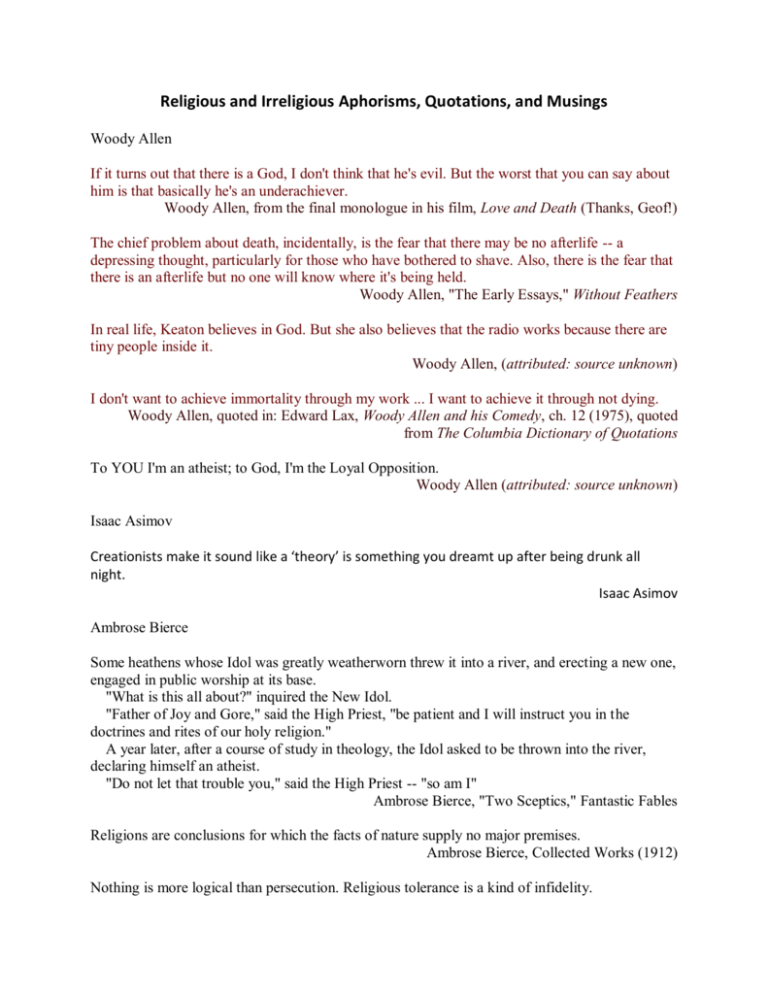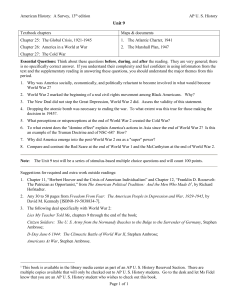Religious and Irreligious Aphorisms, Quotations, and Musings
advertisement

Religious and Irreligious Aphorisms, Quotations, and Musings Woody Allen If it turns out that there is a God, I don't think that he's evil. But the worst that you can say about him is that basically he's an underachiever. Woody Allen, from the final monologue in his film, Love and Death (Thanks, Geof!) The chief problem about death, incidentally, is the fear that there may be no afterlife -- a depressing thought, particularly for those who have bothered to shave. Also, there is the fear that there is an afterlife but no one will know where it's being held. Woody Allen, "The Early Essays," Without Feathers In real life, Keaton believes in God. But she also believes that the radio works because there are tiny people inside it. Woody Allen, (attributed: source unknown) I don't want to achieve immortality through my work ... I want to achieve it through not dying. Woody Allen, quoted in: Edward Lax, Woody Allen and his Comedy, ch. 12 (1975), quoted from The Columbia Dictionary of Quotations To YOU I'm an atheist; to God, I'm the Loyal Opposition. Woody Allen (attributed: source unknown) Isaac Asimov Creationists make it sound like a ‘theory’ is something you dreamt up after being drunk all night. Isaac Asimov Ambrose Bierce Some heathens whose Idol was greatly weatherworn threw it into a river, and erecting a new one, engaged in public worship at its base. "What is this all about?" inquired the New Idol. "Father of Joy and Gore," said the High Priest, "be patient and I will instruct you in the doctrines and rites of our holy religion." A year later, after a course of study in theology, the Idol asked to be thrown into the river, declaring himself an atheist. "Do not let that trouble you," said the High Priest -- "so am I" Ambrose Bierce, "Two Sceptics," Fantastic Fables Religions are conclusions for which the facts of nature supply no major premises. Ambrose Bierce, Collected Works (1912) Nothing is more logical than persecution. Religious tolerance is a kind of infidelity. 2 Collected Works (1912), quoted from James A Haught, ed., 2000 Years of Disbelief Theology is a thing of unreason altogether, an edifice of assumption and dreams, a superstructure without a substructure. Collected Works (1912), quoted from James A Haught, ed, 2000 Years of Disbelief Camels and Christians receive their burdens kneeling. quoted from James A Haught, ed, 2000 Years of Disbelief Christian, n. One who believes that the New Testament is a divinely inspired book admirably suited to the spiritual needs of his neighbor. One who follows the teachings of Christ in so far as they are not inconsistent with a life of sin. Ambrose Bierce, The Devil's Dictionary (1911) Clergyman, n. A man who undertakes the management of our spiritual affairs as a method of bettering his temporal ones. Ambrose Bierce, The Devil's Dictionary (1911) Deluge, n. A notable first experiment in baptism which washed away the sins (and sinners) of the world. Ambrose Bierce, The Devil's Dictionary (1911) Evangelist, n. A bearer of good tidings, particularly (in a religious sense) such as assure us of our own salvation and the damnation of our neighbours. Ambrose Bierce, The Devil's Dictionary (1911) Faith, n. Belief without evidence in what is told by one who speaks without knowledge, of things without parallel. Ambrose Bierce, The Devil's Dictionary (1911) Heathen, n. A benighted creature who has the folly to worship something he can see and feel. Ambrose Bierce, The Devil's Dictionary (1911) Houri, n. A comely female inhabiting the Mohammedan Paradise to make things cheery for the good Mussulman, whose belief in her existence marks a noble discontent with his earthly spouse, whom he denies a soul. Ambrose Bierce, The Devil's Dictionary (1911) Immortality, n. A toy which people cry for, And on their knees apply for, Dispute, contend and lie for, And if allowed Would be right proud Eternally to die for. 3 Ambrose Bierce, The Devil's Dictionary (1911) Impiety, n. Your irreverence toward my deity. Ambrose Bierce, The Devil's Dictionary (1911) Infidel, n. In New York, one who does not believe in the Christian religion; in Constantinople, one who does. Ambrose Bierce, The Devil's Dictionary (1911), seen in James A Haught, ed, 2000 Years of Disbelief Irreligion, n. The principal one of the great faiths of the world. Ambrose Bierce, The Devil's Dictionary (1911) Koran, n. A book which the Mohammedans foolishly believe to have been written by divine inspiration, but which Christians know to be a wicked imposture, contradictory to the Holy Scriptures. Ambrose Bierce, The Devil's Dictionary (1911) Mammon (riches), n. The god of the world's leading religion. Ambrose Bierce, The Devil's Dictionary (1911) Piety, n. Reverence for the Supreme Being, based upon His supposed resemblance to man. The pig is taught by sermons and epistles / To think the God of Swine has snout and bristles. Ambrose Bierce, The Devil's Dictionary (1911) Pray, v. To ask that the laws of the universe be annulled in behalf of a single petitioner, confessedly unworthy. -- Ambrose Bierce, The Devil's Dictionary (1911) Rack, n. An argumentative implement formerly much used in persuading devotees of a false faith to embrace the living truth. Ambrose Bierce, The Devil's Dictionary (1911) Redemption, n. Deliverance of sinners from the penalty of their sin, through their murder of the deity against whom they sinned. The doctrine of Redemption is the fundamental mystery of our holy religion, and whoso believeth in it shall not perish, but have everlasting life in which to try to understand it. Ambrose Bierce, The Devil's Dictionary (1911) Religion, n. A daughter of Hope and Fear, explaining to Ignorance the nature of the Unknowable. Ambrose Bierce, The Devil's Dictionary (1911) Reliquary, n. A receptacle for such sacred objects as pieces of the true cross, short-ribs of saints, the ears of Balaam's ass, the lung of the cock that called Peter to repentance, and so forth. 4 Reliquaries are commonly of metal, and provided with a lock to prevent the contents from coming out and performing miracles at unseasonable times. Ambrose Bierce, The Devil's Dictionary (1911) Reprobation, n. In theology, the state of a luckless mortal prenatally damned. The doctrine of reprobation was taught by Calvin, whose joy in it was somewhat marred by the sad sincerity of his conviction that although some are foredoomed to perdition, others are predestined to salvation. Ambrose Bierce, The Devil's Dictionary (1911) Revelation, n. A famous book in which St John the Divine concealed all that he knew. The revealing is done by the commentators, who know nothing. Ambrose Bierce, The Devil's Dictionary (1911) Reverence, n. The spiritual attitude of a man to a god and a dog to a man. Ambrose Bierce, The Devil's Dictionary (1911) Saint, n. A dead sinner revised and edited. Ambrose Bierce, The Devil's Dictionary (1911) Scriptures, n. The sacred books of our holy religion, as distinguished from the false and profane writings on which all other faiths are based. Ambrose Bierce, The Devil's Dictionary (1911) Trinity, n. In the multiplex theism of certain Christian churches, three entirely distinct deities consistent with only one. Subordinate deities of the polytheistic faith, such as devils and angels, are not dowered with the power of combination, and must urge individually their clames to adoration and propitiation. The Trinity is one of the most sublime mysteries of our holy religion. In rejecting it because it is incomprehensible, Unitarians betray their inadequate sense of theological fundamentals. In religion we believe only what we do not understand, except in the instance of an intelligible doctrine that contradicts an incomprehensible one. In that case we believe the former as a part of the latter. Ambrose Bierce, The Devil's Dictionary (1911) Charles Russell Darwin It appears to me (whether rightly or wrongly) that direct arguments against Christianity and theism produce hardly any effect on the public; and freedom of thought is best promoted by the gradual illumination of men’s minds which follows from the advance of science. It has, therefore, the always my object to avoid writing on religion, and I have to confined myself to science. Charles Russell Darwin, Letter to Edward Aveling Erasmus Darwin 5 Unitarianism [is] a feather-bed to catch a falling Christian. Erasmus Darwin, As recalled by Charles Darwin in Autobiographies (2002) Alfred North Whitehead – an early and very explicit statement of the Separate Magisteria claim The clash is a sign that there are wider truths and finer perspectives within which the reconciliation of a deeper religion and the more subtle science will be found. . . . Science is concerned with the general conditions which are observed to regulate physical phenomena; whereas religion is wholly wrapped up in the contemplation of moral and aesthetic values. On the one side there is the law of gravitation, and on the other of the contemplation of beauty and holiness. What once side sees, the other misses; and vice versa. Alfred North Whitehead, Lowell Lectures, 1925 Michael Parenti Clerical authorities repeatedly have made themselves accessories to the crime, playing an active role in obstructing justice, arguing in court that criminal investigations of “church affairs” violated the free practice of religion guaranteed by the US Constitution—-as if raping little children were a holy sacrament. Michael Parenti, Pedophiles and Popes, Political Affairs.net, May, 2010 Salman Rushdie If Woody Allen were a Muslim, he'd be dead by now. Salman Rushdie, quoted in: Independent (London, 18 February 1989), from The Columbia Dictionary of Quotations








